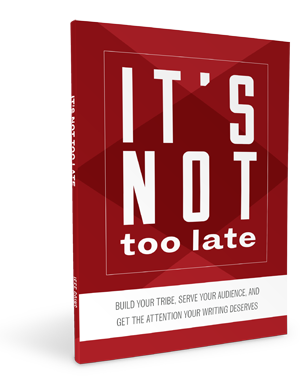Jeff Goins's Blog, page 34
October 12, 2016
124: How to Live the Good Life with Jonathan Fields
What is the good life? This is one question you can ask one million people and expect to hear one million different answers. Even though we’ll have different answers to this question, there are common themes between us all.
For me, I thought the good life was getting more influence, money, and skill. But after I got everything I wanted, I still felt like something was missing.
It took time and gut-wrenching conversations with family and friends to help me figure this out. I had to make some big changes to help me reboot and get back on the right track.
It’s never too late for you to make changes and pursue what matters most. But before you make any changes, it’s important to think through what living the good life really is.
This week on The Portfolio Life, Jonathan Fields and I talk about how to live a good life. Jonathan shares a simple, yet profoundly helpful, model that will enable you to reclaim your life and pursue a life well lived.
If you need help discovering what the good life means and what you need to do to live it, then I encourage you to listen in. Jonathan is one of the best when it comes to understanding what it takes to live a good life.
Listen to the podcast
To listen to the show, click the player below (If you are reading this via email or RSS, please click here).
Show highlights
In this episode, Jonathan and I discuss:
How to navigate career transitions
The importance of creating art in such a way people will pay you for it
The difference between makers and helpers, and why this matters to you
Bouncing back from setbacks
The major themes you need to know about living the good life
Why you cannot neglect the little moments of life in pursuit of the big moments
Jonathan’s “Good Life Buckets” system
Evaluating your life and making changes
Quotes and takeaways
“I love the blank canvas and blank white page. That’s my playground.” —@jonathanfields
To get paid for your work, identify how your skills can meet needs of others.
Your ability to do meaningful work and build relationships will be capped by how well you take care of yourself.
Resources
How to Live a Good Life by Jonathan Fields
Good Life Project
Good Life Project Camp
Download the full transcript here.
What does living the good life mean to you? Share in the comments.

October 10, 2016
It’s Not Too Late to Succeed as a Writer (Free eBook)
Every day, someone emails me asking me the same question: “Is it too late?”
They want to start a blog, but worry that ship has already sailed.
They dream of writing books for a living, but wonder if that’s even possible anymore.
They hear my story about how I started writing online years ago and how I turned it into a successful, full-time career as an author, speaker, and blogger.
But does this stuff still work?
Why you can still succeed as a writer
It’s a valid question, but in my mind, a silly one.
Why?
Because every year, I meet hundreds of people who do it — who start a blog or begin writing even though they feel like they’re late to the game. And I watch as these people apply timeless principles to their writing careers and succeed.
Yes, I did this a few years ago and succeeded — at a time when I felt like the Internet was a crowded place and there wasn’t any more room for another blogger or writer. But more importantly, I see people do it every year, every month, all the time.
Why does it still work?
Because the world is still hungry for more great work.
Because there’s still one story we haven’t heard yet, one idea we haven’t seen: Yours.
So it’s time to give us what you’ve got. To share your gift.
It’s not too late.
Click here to get It’s Not Too Late for free for a limited time.
Are you worried it’s too late to succeed as a writer? Share in the comments.

October 5, 2016
123: How Community Will Help You Become a Better Writer with Diana Glyer
Writing is a battle. It’s a fight to find the right words to express your thoughts or feelings, capture the beauty of a sunset, or explore the depths of the human heart. But writing is not a battle you have to fight by yourself.
As a writer or creative person, you don’t have to do your work completely alone. You don’t have to scale a mountainside, retreat to solitude for 40 days, and then descend with a glorious work of art for people to gaze upon in amazement.
Most pieces of great art are not created in isolation. They are forged in community and collaboration with others.
To create great work and succeed as a writer, you will need a community of people who care about you and your work. Someone in your life who will hold you accountable, encourage you when you’re down, and tell you the truth when you can do better.
This week on The Portfolio Life, Diana Glyer and I talk about why great art needs to be created in community.
Diana shares invaluable lessons on writing, sustaining a creative life, and the power of community from one of the most famous literary groups of all-time—the Inklings.
Listen in as Diana and I discuss what you can learn from the Inklings about the creative life, and practical steps you can take to build your own creative community of support.
Listen to the podcast
To listen to the show, click the player below. (If you are reading this via email or RSS, please click here.)
Show highlights
In this episode, Diana and I discuss:
Who the Inklings are, and why this group still matters today.
The dynamics and quirks of literary groups.
How community can positively influence your work.
Why people believed the individuals within the Inklings were immune to influence from each other.
The pervasive myth of the solitary genius.
How great art and writing is forged in community.
Why writing is not a momentary flash of genius, but a slow and steady work of art.
What you need to know about the transactional nature of writing.
Steps you can take to build your own literary group.
Quotes and takeaways
We are mesmerized by the end of the story, but we forget about the beginning.
To build community, you have to take a risk and share your work with others.
Start small when you build a community of support.
Loneliness will leave you feeling empty, but community will help you sustain your work.
Resources
Bandersnatch , by Diana Glyer.
The Company They Keep , by Diana Glyer.
The Inklings , by Humphrey Carpenter.
Powers of Two , by Joshua Shenk.
Tribe Writers.
Download the full transcript here.
Who are you going to surround yourself with on your writing journey? Share in the comments.

October 3, 2016
What Most Self-Published Authors Do Wrong (and What This One Did Instead)
Over the last four years, I’ve published four books, with the first being self-published. As a writer, I’ve continued to release projects on my own, and one of the things I’ve learned about this term, self-publishing, is that it is completely deceiving.
As I’ve shared before, every story of success is really a story of community. No one succeeds alone. No one.
Generations ago, when publishing gatekeepers were the only way to share your words with the world, getting published meant someone was going to take care of you. F. Scott Fitzgerald used to ask for (and receive!) personal loans from his editor at Scribners. Thomas Wolfe didn’t know how his own novel was being received until the same publisher called him with news of the early reviews.
The power dynamic was forever in the gatekeepers’ favor, and many writers were affected.
Now that self-publishing has blown up the old model, writers don’t need publishers to accept and bless their work any longer, which is a good thing. You don’t need an editor of one of the “Big 5” publishers to give you an audience.
In fact, you don’t need anybody to fulfill your dreams of becoming a best-selling author.
Or do you?
It’s a mistake to assume that self-publishing means you can do it by yourself. From editing your work to preparing a launch, there are countless details that go into any publishing effort, and it would be a disservice to your craft to think you can or should do it alone.
What’s worse, when you do this, you cut yourself off from the very community that wants to support your work and see you succeed.
The power of community
Truth be told, this misconception about self-publishing is one of the reasons I created Tribe Writers, my online course and community for writers who want to learn how to market and sell their work.
I knew how many authors, myself included, were confused about how to find and engage their tribes, and I was frustrated that the information I needed early on was scattered in so many different places.
Tribe Writers was my attempt to correct a persistent myth about writing — that it’s something you can succeed at alone.
“The biggest danger of self-publishing is thinking you can do it yourself.Tweet thisTweet
Whether your readers are targeted and wooed by your publisher on your behalf or gathered one by one through your own efforts, you cannot become a best-selling author without others.
Last fall, I opened the doors to another class of Tribe Writers. One of the students was David Mike, a cosmetology instructor from Omaha, Nebraska. (Everyone knows I respect anyone who respects the hair game.)
David had been hearing from family and friends for years that he needed to write a book. His life story included military service and prison time, drug dealing, and redemption. But does living an incredible story automatically mean you should shop it around to publishers? David wasn’t interested in that approach.
So what did he do? Self-publish, of course. And he did it the right way — with the support and assistance of others.
This past summer, David published Dishonor, one of the many excellent books to come out of the Tribe Writers community.
Thanks to the tribe he found there and beyond, he went from not even calling himself a writer to publishing a memoir that has received, in under two months, over 70 5-star reviews. He is now working on his second and third books and says it was his tribe that helped him do it.
Did you catch that?
He used the power of community to share his very personal story with the world. And it worked.
“Forget what you’ve heard about lone geniuses. You cannot succeed without others.Tweet thisTweet
In the Tribe Writers course, we teach writers a four-step method to get their work the attention it deserves. Through each module, the theme of community is constant. At each step of the way, you learn how to grow and engage a tribe that will read and help spread your work.
Tribe-build your way to a best-selling book
David followed the process and achieved incredible success. He’s one of many students reaping the recurring benefits of building a tribe. So my team and I reached out to him to ask what advice he had for other writers. In the spirit of community and generosity, he responded with the following six tips.
1.Work together.
In Tribe Writers, David found an instant network of fellow writers and creatives. After taking the course, he quickly learned how powerful it is to surround yourself with people who understand what you’re trying to do. He said:
I’m not building community so I have someone to sell to. I’m doing it so that we all have each other’s support. We all need people to bounce ideas off of and tell us how we’re doing. A friend outside your writing community will just say whatever you’ve written is good, but a fellow writer can tell you exactly what you need to do and why.
It’s about helping each other.
2. Practice in public.
“I published the first third of Dishonor chapter by chapter on my blog,” David says. “Once I got into the Tribe Writers Facebook group, the second two-thirds of the book got way better because I was getting regular feedback from the other writers in that group.”
There was such a difference in quality between the first third and the final two-thirds that he went back and rewrote the former.
3. Start before you’re ready.
Left to his own devices, David says he wouldn’t have gathered a launch team until it was too late. But on the advice of his editor, he decided to start a Dishonor Facebook group midway through the writing process, and the first day, 400 people showed up.
Who were they?
They were his blog and Twitter followers, family members, friends, and people he knew from Facebook.
“There’s tremendous power in surrounding yourself with people who understand what you’re trying to do.Tweet thisTweet
Writers often underestimate the scope of their own network. By the time the book was ready to publish, David had nearly doubled his initial audience, which made for a nationwide launch team that was eager to help him. Because he’d created a community, these same supporters were also his first customers and most enthusiastic evangelists.
4. Host a cover party.
David made a small, specific request of his first readers: “Take a selfie with your copy of Dishonor, and post it on social media.” Even he was surprised by the outpouring.
Multiple postings later, it started to look like everyone was reading his book, which helped catch the attention of even more readers. David’s request worked because it was mutual: readers got to share a bit of themselves with their followers, and David got the benefit of grassroots publicity.
This is the give and take of a healthy community.
5. Remember your offline community.
If you’re from Omaha like David, you may have seen the review for Dishonor in the Omaha World Herald a few weeks ago. Or maybe you were present at his launch party, where free books and good coffee were part of the local celebration.
David’s launch was so community-centric that he is now leveraging the success of the book into speaking opportunities at local churches, men’s groups, and schools. He dreams of getting physical copies of the book into prisons, where it can help and inspire the group he used to count himself a part of.
6. Find your tribe.
In the acknowledgments section of Dishonor, David wrote that it was my self-published book, You Are a Writer, that inspired him to become an author. But that’s giving me too much credit. I would argue that he was a writer all along and that all he needed — all any of us need — is a community to affirm, challenge, and support us along the way.
So if you’re struggling to find your tribe — that audience that eagerly awaits your message — do what David did and build a community right now, right where you are. It just might surprise you.
It bears repeating: Every story of success is a story of community. Make sure you find yours.
FYI: Tribe Writers isn’t open to new students just yet, but I’m putting the final touches on a new free book and training series for writers who want to tribe-build their way to a best-selling book. Stay tuned for more.
David’s book, Dishonor, is available on Amazon. You can find him at dilemmamike.com, or on Twitter @dilemmamike. Thanks for being part of our Tribe Writers community, David, and for inviting all of us to be part of yours.
Have you found your community? Share in the comments.

September 28, 2016
122: The Most Important Decision You’ll Make as a Writer
Life is full of choices. Between the clothes we wear, the food we eat, and the words we speak, we make hundreds—if not thousands—of choices every day. But out of all of the choices we make, there’s one important thing you have to decide when it comes to your work.
 “The number one most important thing is knowing why you are doing what you are doing.” This statement was made by Derek Sivers at the 2015 World Domination Summit. It cut me right to my heart.
“The number one most important thing is knowing why you are doing what you are doing.” This statement was made by Derek Sivers at the 2015 World Domination Summit. It cut me right to my heart.
At the time, I was fairly new to working full time as a writer and running a small, yet growing business. I was just starting to see success and make good money, but I was really struggling with the lack of freedom I had.
When it comes to our work, Derek pointed out that we really have to decide is whether we want to pursue money, fame, or freedom. We can end up with one or two of these, and some of us may end up having all three. But here’s the truth: We can’t pursue them all at once.
What you want out of life will determine how you pursue your work. It will help you set goals, define boundaries, and pick priorities that move you in the direction you want to go.
This week on The Portfolio Life, Andy Traub and I share a clip from Derek Sivers’ talk at World Domination Summit, and discuss how it helped me to think through my work, and how you can decide what matters most to you.
Every writer and creative person will wrestle with this decision. Listen in as Andy and I share our personal experiences with the choice we made to better understand what path to pursue.
Listen to the podcast
To listen to the show, click the player below. (If you are reading this via email or RSS, please click here.)
Show highlights
In this episode, Andy and I discuss:
Optimizing your life for what you—not others—want to accomplish.
My struggle with identifying the most important thing to me.
Why you can’t pursue money, fame, and freedom simultaneously.
Being aware of what’s most important to you.
Understanding the pros and cons behind our pursuits.
Quotes and takeaways
You can have anything you want. But you can’t have everything.
More and more money won’t make you happier.
Don’t build a company if you don’t want to run a company.
Resources
Uncommon Sense, Derek Sivers at World Domination Summit.
Anything You Want , by Derek Sivers.
The 4-Hour Workweek , by Tim Ferris.
Don’t Chase Happiness. Recognize It, by Joshua Becker.
Download the full transcript here.
What are you optimizing your life for? What steps do you need to take today? Share in the comments

September 26, 2016
4 Mistakes Every New Writer Makes (and How to Avoid Them)
As a writer, I’ve made a lot of mistakes. After five books, more than a thousand blog posts, and over a decade of blogging, I still mess up. And making mistakes is a good thing, because it means I’m still writing.
If you’re not messing up, then you’re not doing your work. You’re not pushing yourself to the utter limits and testing what you’re capable of. You’re just playing it safe.
Furthermore, most mistakes don’t matter as much as we think they do. A typo here or there doesn’t break a career. A blog post that falls flat isn’t the end. Even a book that doesn’t sell is more of a speed bump than a stop sign.
“If you’re not messing up, then you’re not doing your work.Tweet thisTweet
But there are four mistakes I see new writers making over and over again, and these mistakes actually can end a career. What’s worse, they’re completely voluntary. Writers choose to make them, often unknowingly, and then their career suffers.
So here are four don’ts every new writer does — and what to do instead.
1: Don’t choose a niche
Writers are often told to choose a niche before they start. The advice is to pick a thing you’re interested in, know a lot about, and can teach to others. This isn’t terrible advice. But it’s incomplete.
Because here’s the thing about choosing a niche: eventually, it’s going to bore you. You might love wedding planning or philosophy today, but your interests will change as you further chase mastery.
And one day, you will want to write about other things.
This happens to all of us, even the masters:
Edgar Allen Poe wrote first about youth before pivoting to the macabre.
Roald Dahl wrote a celebrated wartime story before deciding he was actually a children’s author.
Ernest Hemingway wrote poems and short stories before penning his first novel.
What would our libraries and English classes look like if these writers had stuck to their original niches?
The danger of choosing any one niche is that when your day of boredom comes (and it will), you will find yourself with a frustrated audience. If they’re there to read your posts on pet training, they will drift away when you start writing science fiction. If you’ve built a tribe around the topic of global travel, you risk a mass exodus when you pivot to online marketing.
Fortunately, there’s a way around this limiting advice to choose a niche.
What to do instead: Choose a worldview.
A worldview is the state of mind you write from. It is not topic-based at all, but perspective-based. It asks that you share how you see the world, and how you and your readers can join forces to either celebrate that world or change it.
A worldview allows you the freedom to chase what fascinates you, write about it from your unique vantage point, and connect with your readers in an enduring way. It allows you to find a connection with your audience that goes much deeper than any one topic.
In the last few years on this blog, I’ve written a lot about writing. But that’s not my only topic. I’ve also written about losing friends, hosting conferences, and productivity. I’ve written about my family, business, and health. What I’ve learned is that when I write from my worldview, the topic doesn’t matter as much as I think it does. The same is true for you.
So how do you find your worldview? It’s a simple formula, actually. Fill in the blanks in this sentence:
Every [BLANK] should [BLANK].
The first blank is where you define your audience (in my case, it’s creative people). Whom do you want to write for? Who is your audience, your tribe? Whom do you want to serve?
The second blank is where you fill in what that audience can expect from you – your expertise, insight, or area of focus. For me, it’s resources and guidance about finding the attention your work deserves.
In my case, the complete sentence reads, “Every creative should care enough about their work to help it spread.” Yours will be different. Here are some examples:
“Every parent should teach their kids to cook” is a worldview that gives both freedom and structure to a food writer.
“Every entrepreneur should build a personal brand” is a worldview my friend Chris Ducker has used to write books, host conferences, and build a tribe of over a million people.
Whatever it is, your worldview should be broad enough to include all the topics you want to write about, but focused enough to attract only the right readers.
Action step: Fill in the above statement to define your worldview.
2: Don’t hide your talent
Recently, my friend Jon Acuff tweeted,
“Authors, if someone says you talk about your book too much, ask them if they show up for their job Monday-Friday too.”
I love that.
As writers, we must acknowledge our job description. We are not so lucky as to just write masterpieces and then wash our hands of them. In fact, that’s never been the case for creatives throughout history. We sometimes think those who came before us had it easier than we do. They didn’t.
It is part of your job to promote and share your work so that others can find it. Because more than a million books are published worldwide every year, yours will get lost if you don’t do the work of being an author. I’m not talking about the writing. That’s a given. I’m talking about regularly sharing your work. Too few writers do this, and too many suffer as a result.
What to do instead: Establish your platform.
Establishing your platform is new writer code for “build an email list.” You can do this for free starting today, and I hope you will. Email is still the most powerful way to communicate online. I get more “mileage” out of my newsletter than any other platform I have — including my blog. If I send a link, people click it. If I ask a question, people answer.
Your email list is your dedicated group of readers and followers who will be more engaged with your worldview than any other group. They are the ones you’ll turn to when you have questions, want to connect, and are ready to start offering your work for sale.
“It is part of your job to promote and share your work so that others can find it.Tweet thisTweet
That’s exactly what happened for my friend Stephanie Halligan, whose email list was still very small and new when she pitched her first motivational cartoon print for sale a few years ago. She didn’t expect anything, but she was wrong. Stephanie made her first sale in just 24 hours, and she’s been making a living with her creativity ever since.
You can do this, too.
To start building an email list, you need only three things:
A good email service. There are free and paid options available for people at every budget level. A great one that a lot of my friends are using lately is ConvertKit.
An awesome signup form. You’ll find walk-through tutorials right in your email service to help with this. Your signup form needs to be obvious and not hideously ugly. If your website doesn’t have a clear opt-in form, I promise that you’re missing out on a lot of potential new readers.
An incentive. You need to give people a compelling reason to give you their email address. This can be an eBook, a video, or a free MP3 download —whatever will help your readers. It’s an “ethical bribe” that allows you to reward subscribers with something other than just your content.
Action step: Pick an email service provider, create a signup form, and develop an incentive.
3: Don’t wait for people to come to you
Once you’ve defined your worldview and started an email list, you’re only partway there. Many writers think they’ve arrived by this stage, then wonder why their work isn’t getting the attention they think it should. They send out sporadic emails to a list of family and friends, and never bother to learn about the broader opportunities available to them.
Why?
Because it’s easier to settle for good enough.
This third step involves real, hard work, and it doesn’t always feel creative the way we think our lives as writers should. Sometimes, we’d rather settle for whatever humble success we have than risk it all for the chance to help more people.
What to do instead: Expand your reach.
Expanding your reach starts with finding a tribe that needs a leader. Perhaps your audience of food writers needs someone to write honestly about cooking for seniors. Maybe the readers of your thriller series want to read more about your creative process.
You’ll find the first members of your tribe by following step 2 above, but the truth is that’s much too passive to be sustainable. You cannot just “build it and they will come.” You have to build it and then go find the tribe that needs it.
There are a variety of ways to do this. The good news is that tribes tend to hang out together, both in person and online. When you find a few, it’ll get easier to find more.
Action step: Start guest posting.
Guest posting is still the most powerful way to get your words in front of new audiences. And if you have an email list with some kind of lead magnet (an incentive for joining your list), you can link back to that, driving traffic to your website and converting those visitors into committed readers.
4: Don’t call yourself an aspiring writer
So you’ve found your worldview. You’ve established your home base and outposts to share your message and draw people in. You’ve learned how to choose and use tools to expand your reach, and you’ve served your way into guest posting opportunities and relationships with influencers. If you’re like many authors, you’re about to make the most critical mistake of all. You’re about to assume you’re done.
Honestly, it never ends, this cycle of serving, building relationships, and growing as a writer. And that’s a good thing. It means you’ve earned the right to do this work for one more day. That’s all success really is.
“It’s easy to settle for good enough.Tweet thisTweet
Author Steven Pressfield says you have to turn pro in your mind first. At Tribe Conference this year, his editor, Shawn Coyne, went on to explain that being a professional writer has nothing to do with external markers of success, but everything to do with how you define yourself. If you’re committed to mastering this craft and doing the work every day, you’re a pro. If you get up to write again after a day of rejection and failure, you’re a pro. And that’s all there is to it.
My friend Tim Grahl was up on stage with Shawn at the time. A successful marketer and author in his own right, even Tim struggled with this at first. Are we really pros if we have nothing to show for it? he countered. What does it matter if I say I’m a pro but can’t write a story that works?
Shawn was adamant in enforcing a point that even I have written about extensively: action follows identity. You’ll never be more than an amateur if that’s all you ever call yourself.
What to do instead: Go pro.
All writers have an endgame in mind. At least, they do if they’re smart. You want to publish a message that matters. And you can do that only if you’re committed to the work.
Decide you are more than a hobbyist. Commit to calling yourself a professional writer, then take the necessary steps to prove you are one. Seek out the resources you need to master your craft and promote your work. If you stop now, all your work will be wasted.
Action step: Decide you are a pro. Do it right now. Write it down, and say it out loud. You are when you say you are.
Educate yourself about finding your tribe, building a platform, and mastering your craft. I may be biased, but I think this site is a pretty good (and free!) resource for all that information.
Make friends with the business side of creativity. Money is a part of life. And there’s nothing wrong with getting paid for your words. In fact, building a business around your writing is the only sustainable way to keep doing it. When your art solves a problem in the world, you bring value. You can offer a course or an event. A book or an experience. Something people will pay for. And when you do this, you have peace of mind and the freedom to be even more generous.
So get creating.
If you’ve made any of these mistakes, it’s not too late to course correct. You can get the attention your work deserves if you immerse yourself in the action steps throughout this post.
Have you made any of these four mistakes? Share in the comments.

September 21, 2016
121: Why You Need to Let Go of Your Ego with Ryan Holiday
Many writers strike a fine balance between ego and self-deprecation. As creatives, we need to be confident in who we are while fighting off the temptation to belittle ourselves after writing a blog post, editing a scene in our book, or facing rejection for the umpteenth time. So, how do we manage ego as writers?
The life of a writer—or any creative, for that matter—is difficult. There’s this sense of pride we wrestle with, thinking that everything we write needs to be perfect. Our words will be critiqued for their accuracy and style, and for whether or not they’re any “good.”
I struggle with this. I want every email, blog post, or book I write to be both correct and brilliant. I have been known to correct my friends’ grammar over text messages.
This type of constant pressure can break anyone over time. The temptation is to settle for “good enough,” or to succumb to the pressure and walk away from your work completely.
This week on The Portfolio Life, Ryan Holiday and I talk about how to manage your ego, be aware of its presence, and still pursue great work as a writer. Ryan also lets us peer into how he prepares to write a book by conducting massive amounts of research and focusing on his writing habits.
Listen in as Ryan shares the destructive nature of ego, humbling experiences he’s learned along the way, and multiple writing and book publishing tips.
Listen to the podcast
To listen to the show, click the player below. (If you are reading this via email or RSS, please click here.)
Show highlights
In this episode, Ryan Holiday and I discuss:
The good, bad, and ugly sides of ego.
Why you need to be crazy if you desire to change the world.
How ego lurks around good intentions.
Why dealing with ego is a constant process that never goes away.
An important lesson Ryan learned from interacting with different opinions.
Taking the time to investigate a topic before diving headfirst into it.
Why faking it until you make it is horrible advice.
Why there’s no such thing as “making it.”
How ego will keep you from mastering your craft.
The hidden benefit of being a student or mentee.
The secret to finding a mentor.
Why Ryan’s books are a feat of discipline and not inspiration.
The importance of writing a book that people will read and recommend.
Book titles and book covers.
Ryan’s research process, and how long it takes him to write a book.
What it means to be a New York Times best-seller.
Quotes and takeaways
Instead of faking it until you make it, you should work until you make it.
Ego is the most dangerous when you’re just starting out.
Develop a skill. This places you in a much better position to help others.
Resources
Ego Is the Enemy , by Ryan Holiday.
The Obstacle Is the Way , by Ryan Holiday.
The Ryan Holiday Reading Recommendation Email.
The Notecard System: The Key For Remembering, Organizing and Using Everything You Read, by Ryan Holiday.
Behind the Scam: What Does It Take to Be a ‘Best-Selling Author’? $3 and 5 Minutes, by Brent Underwood.
How do you look at your ego differently now? Share in the comments

September 19, 2016
The More Books You Write, the Harder it Gets (The Secret to Writing Mastery)
Recently, I finished writing my fifth book. I thought it’d be done in March, so naturally, it was complete six months after that. This is often the way it goes.
Writing a book is hard. I don’t think that statement should surprise anyone who’s acquainted with this craft, this trade that Ernest Hemingway said contained no masters, only apprentices.
But the thing that surprises me about writing, the thing that I never would have learned had I not decided to commit my life’s work to it is this:
The more you do it, the harder it gets.
Sure, there are parts that become less taxing, like developing the discipline to write every day or growing your ability to write a sentence that is grammatically correct. Practice can make certain parts seem effortless. But it can also reveal how much more you need to grow.
That’s what happened to me recently.
Now that my publisher has my latest book (it should be out next summer, by the way), I am struck with the realization that the experience of writing it has been harder, more grueling, and more painstaking than any other project I’ve worked on thus far.
“Practice can make your work feel effortless. But it can also reveal how much more you need to grow.Tweet thisTweet
People who know me ask if I am relieved. No. The truth is, I am scared. What if I messed something up? What if I didn’t honor the research well enough, or miscited a source, or simply didn’t do a good enough job stating my case? What if everyone finds out I’m really an imposter?
As Maya Angelou once said:
“I have written eleven books, but each time I think, Uh-oh, they’re going to find out now. I’ve run a game on everybody, and they’re going to find me out.”
No wonder writers are known for their bouts of depression and drinking habits. This stuff is hard.
But the truth is, I think anything you aspire to do with excellence will make you feel this way. The more you do it, the better you do it, the worse you’ll feel. The secret to mastery is that the more you do it, the harder it will become.
Why is this?
1. It means you’re actually taking your work seriously.
I don’t think this is necessarily a bad thing—feeling bad for doing good work. At least, in the proper context, it can guide you toward mastery.
This was true for me when I finished the second draft of my latest book and realized I wasn’t even halfway toward a finished product. At that point in my previous book, I was done and satisfied with the work. The chasm between the two books made me sad: A book that went on to become a bestseller was now, in my mind, one that I wouldn’t be proud to turn in.
“The secret to mastery is that the more you do it, the harder it will become.Tweet thisTweet
But this is the way it is. As you grow in your craft, you become more self-conscious. You learn how much you don’t know. And that knowledge makes you humble, and better.
Steven Pressfield once wrote that it’s only the amateur who thinks that he has arrived. The professional is filled with constant self-doubt. If you’re wondering whether or not you have what it takes, that means you do.
So get back to work, and keep growing.
2. It means you’re not done yet.
Along those lines, once we complete a major piece of work, like a book, there’s often this sense of incompletion, emptiness even.
My friend Joe told me this when he completed his memoir the same day I finished my book. I texted him the day after, and he told me that he felt directionless and without purpose now. That made a lot of sense to me.
The truth is, writing a book, even finishing one, will not give you the sense of satisfaction you think it might. And if it does, that feeling won’t last long. This is why so many entrepreneurs sell their businesses only to go start another (see my friend Casey’s post on why selling his business and essentially becoming financially independent didn’t make him happy).
“If you’re wondering whether or not you have what it takes, that means you do.Tweet thisTweet
Why is this? Does it mean the act of creation isn’t all it’s cracked up to be? Not at all. It means that the point of being creative is to be creating, not to be done. Which is why the minute I turned my book in, I started working on a new book. My job is not to be done with the work. My job is to be working.
You are never done. Your master work is not complete. Your best work is far ahead of you—whether you have weeks, years, or decades left. There’s more of your story to share, more work to create, more yet to be done.
3. It means you’re getting better.
Socrates once said that the more he knew, the more he realized he didn’t know. This is the definition of wisdom. The older I get, the less willing I am to give advice, and the more hesitant I am to share an opinion—simply because I realize more and more that I have no idea what I’m talking about.
Even in writing my fifth book, which is basically narrative-driven personal development, I am offering less advice and more just trying to share some stories that I found fascinating.
Getting better means you start focusing more on yourself and less on what other people are doing. Mastery is a deeply personal thing.
“The point of being creative is to be creating, not to be done.Tweet thisTweet
But one thing I do know is this: The more you create, the better you get. But as your capacity to create better work increases so often does your taste. Of course, in the beginning, as Ira Glass has so wonderfully stated, in a creative career, your taste almost always outpaces your talent. As you grow, though, what you can produce will come more into alignment with what you like.
The truth, though, is you will never be satisfied. I’m certainly not. I’ve worked harder on this book than any other by a factor of ten. And yet, I am more worried, more scared, more unsure about this project than anything I’ve previously written. Why? Because I am starting to see how far I have to go, and where mastery truly lies—always on the horizon, in our sights but just beyond reach.
Art is never finished, Leonardo da Vinci once said, only abandoned—and so, your job is not to master the work, but to never abandon it. At least, to never abandon the work you promised yourself you wouldn’t quit. For me, that’s writing. Not a single book. But the act itself. I never want to be done writing, and I never want to abandon it.
“The more you create, the better you get.Tweet thisTweet
When you find yourself feeling dissatisfied with what you’re producing and wondering if you’ll ever have what it takes, take heart. This means that you are better understanding the depth of your craft. The more I write, the more I realize what great writing requires and how far yet I have to go. It’s a challenge, to be sure, but not an insurmountable one.
So, I will keep writing. I will start that next book right now—not tomorrow, not in three weeks, but now. What does this mean? At this point, not much. I’ve opened up a new file on my computer and called it “New Book.” I’ve written one sentence, saying, “This is the next book.”
That’s not much. But then again, for a perfectionist who never feels like his work is done, moving on to the next project is everything. It’s what keeps me going.
The point of being a writer is to be writing. I love finishing projects, I love selling books and helping people. But I love writing even more. That’s what I promised myself when I began this journey five books ago—that if I could just write for a living, I would.
So, if you’ll excuse me, I’ve got to go get started on Book #6.
Have you wrestled with self-confidence? Have you abandoned any work of art that you should restart? Share in the comments.

September 15, 2016
10 Tips on Networking Like a Pro at a Conference
Networking isn’t just something you do during an event. It is a process you must take part in before, during, and after.
Networking leads to new business opportunities and new relationships. It’s paramount to your career and business.
To help attendees, sponsors, and speakers prepare to connect and grow their networks this weekend at the Tribe Conference, or any other conference for that matter, I would like to share 10 tips on networking like a pro at a conference.
1. Practice your elevator pitch
Practice your elevator pitch before you go. Who are you? What do you do? Why are you attending the Tribe Conference?
You will be asked these questions, so rehearsing your answers ahead of time will help you prepare your thoughts. Plus, you might discover another reason why you are attending that you hadn’t considered.
2. Show up early
Try to get to the conference early, and stand near the registration table, entrance, or food area. These are the places where people congregate.
When you first arrive, solo attendees will especially be seeking a friendly connection. Don’t let them become wallflowers.
Also, consider approaching sponsors and introducing yourself. A casual conversation with a conference sponsor led to my book deal. (And to Jeff’s, too, by the way!)
3. Express interest in others
Be more interested in other people than yourself.
4. Ask questions
Ask questions, and actively listen to the answers. Use eye contact and body language to show you are listening.
5. Talk to strangers
Forget what your parents taught you. Everyone is there for a similar reason. You are all sharing the same experience.
A good icebreaker is to ask someone what they thought of a particular speaker or who was their favorite speaker of the day.
6. Be personable
Use a person’s first name several times as you are speaking to help you remember it.
7. Take notes
Take notes on a person’s business card about your conversation to refer to later. Can you help this person? Who should you introduce them to? Don’t forget to bring your cards, too.
8. Keep it fresh
Things can get stale during conferences. Bring mints and gum to keep your breath fresh.
9. Stay hydrated
Drink plenty of water, and go easy on the alcohol.
10. Stay connected
Follow up with each person you meet after the conference. Staying in touch is a crucial part of networking.
Follow up with a pleasant email, remind them what you spoke about, offer them a link to an interesting article, connect on LinkedIn, or schedule a “no agenda” coffee meeting.
Bonus Tip: Use Twitter to follow and meet the speakers before you attend. Jeff’s team has created a convenient list you can subscribe to on Twitter here.
Use my tips, and I guarantee you will have an amazing time at the Tribe Conference or any other conference you attend. Be sure to find me and say hello if you are attending.
Have you set out to network at a conference before? What was your experience like? Share in the
September 14, 2016
120: The Hidden Benefits to Writing Daily and Blogging Consistently
For many years, I accidentally stunted my growth as a writer. You see, I had a bad writing habit that was unexpectedly hurting my growth. And it’s one that many other writers have, too. What is it? Inconsistent writing.

I used to set aside just one day per week to write for 3–4 hours. During this time, my productivity was poor, and my creativity was woefully lacking. But I didn’t realize this was the case until I made a commitment to write daily and blog consistently.
If you write inconsistently, then your ability to master the art and skill of writing will be inconsistent at best. Like me, you’ll struggle with developing your thoughts, finding inspiration, and completing articles, blog posts, and even books.
So, to improve yourself as a writer, you will need to write daily, publish consistently, and relentlessly persevere.
This week on The Portfolio Life, Andy Traub and I talk in detail about why I teach people to write every day, steps you can take toward developing a daily writing habit, and why you should blog consistently.
Since writing daily and blogging consistently are essential components to improving yourself as a writer, I encourage you to listen in to receive encouragement and pick up some tips to help you get started.
Listen to the podcast
To listen to the show, click the player below. (If you’re reading this via email or RSS, please click here.)
Show highlights
In this episode, Andy and I discuss:
Why daily writing is good for you and easier than you think.
What I learned from writing only one day per week.
How inconsistent writing will lead to inconsistent creativity and productivity.
Simple steps you can take to form a daily writing habit.
The pros and cons of writing daily and blogging consistently.
My views on the future of blogging.
How consistently blogging will enhance your dependability and improve your reader engagement.
Quotes and takeaways
If you write infrequently, then your creativity will become inconsistent.
Writing daily will make you a much better writer than writing a bunch of stuff all at once.
The best type of writing practice is done in public.
Resources
(Never) Save it For Later, by Chris Guillebeau.
Take Permission, Andy’s personal website.
The Writing Life , by Annie Dillard.
My 500 Words, a free 31-day writing challenge.
Do you write daily? Do you publish daily? Why or why not? Share in the comments.












